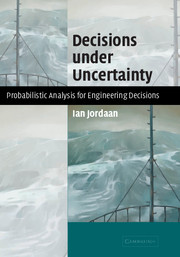Book contents
- Frontmatter
- Contents
- List of illustrations
- Preface
- Acknowledgements
- 1 Uncertainty and decision-making
- 2 The concept of probability
- 3 Probability distributions, expectation and prevision
- 4 The concept of utility
- 5 Games and optimization
- 6 Entropy
- 7 Characteristic functions, transformed and limiting distributions
- 8 Exchangeability and inference
- 9 Extremes
- 10 Risk, safety and reliability
- 11 Data and simulation
- 12 Conclusion
- Appendix 1 Common probability distributions
- Appendix 2 Mathematical aspects
- Appendix 3 Answers and comments on exercises
- References
- Index
2 - The concept of probability
Published online by Cambridge University Press: 05 June 2012
- Frontmatter
- Contents
- List of illustrations
- Preface
- Acknowledgements
- 1 Uncertainty and decision-making
- 2 The concept of probability
- 3 Probability distributions, expectation and prevision
- 4 The concept of utility
- 5 Games and optimization
- 6 Entropy
- 7 Characteristic functions, transformed and limiting distributions
- 8 Exchangeability and inference
- 9 Extremes
- 10 Risk, safety and reliability
- 11 Data and simulation
- 12 Conclusion
- Appendix 1 Common probability distributions
- Appendix 2 Mathematical aspects
- Appendix 3 Answers and comments on exercises
- References
- Index
Summary
Iacta alea est.
Julius Caesar, at the crossing of the RubiconIntroduction to probability
Probability and utility are the primary and central concepts in decision-making. We now discuss the basis for assigning probabilities. The elicitation of a probability aims at a quantitative statement of opinion about the uncertainty associated with the event under consideration. The theory is mathematical, so that ground rules have to be developed. Rather than stating a set of axioms, which are dull and condescend, we approach the subject from the standpoint of the potential behaviour of a reasonable person. Therefore, we need a person, you perhaps, who wishes to express their probabilistic opinion. We need also to consider an event about which we are uncertain. The definition of possible events must be clear and unambiguous.
It is a general rule that the more we study the circumstances surrounding the event or quantity, the better will be our probabilistic reasoning. The circumstances might be physical, as in the case where we are considering a problem involving a physical process. For example, we might be considering the extreme wave height during a year at an offshore location. Or the circumstances might be psychological, for example, when we are considering the probability of acceptance of a proposal to carry out a study in a competitive bid, or the probability of a person choosing to buy a particular product. The circumstances might contain several human elements in the case of the extreme incoming traffic in a data network.
Information
- Type
- Chapter
- Information
- Decisions under UncertaintyProbabilistic Analysis for Engineering Decisions, pp. 20 - 89Publisher: Cambridge University PressPrint publication year: 2005
